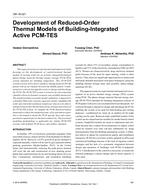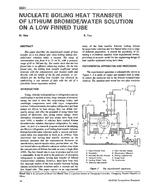This paper presents a numerical simulation study of control strategies for a floor heating system in an outdoor test room with high passive solar gains. Two different quantities of floor thermal mass —5-cm-thick-slab and 10-cm-thick-slab — are considered and simulations are performed for sunny or cloudy cold winter conditions. Two different thermostat setpoint profiles were considered for proportional control of the room air temperature or of the operative temperature: constant setpoint and half-sinusoid. Shutoff control based on a maximum floor surface temperature of 29 °C and combined feedback-outdoor reset control were also considered. An explicit one-dimensional finite difference model was employed. Significant heating energy savings were observed due to storage of passive solar gains incident on the floor thermal storage mass, especially when a half-sinusoid setpoint profile was employed. Control of auxiliary heating based on a room effective (operative) temperature is shown to result in improved thermal comfort and higher utilization of passive solar gains as compared to room air temperature control. Outdoor reset control combined with feedback control of room temperature eliminates occurrences of uncomfortable lows but results in room overheating, especially on sunny days, and higher energy consumption as compared to proportional feedback control; shutoff control based on floor surface temperature is necessary with reset control.
Units: SI
Citation: Symposium, ASHRAE Transactions, vol. 108, pt. 2
Product Details
- Published:
- 2002
- Number of Pages:
- 9
- File Size:
- 1 file , 420 KB
- Product Code(s):
- D-8867


